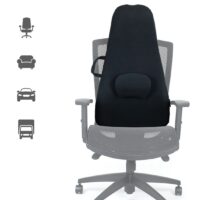How to Avoid Repeat Back Strain
It’s easier to see how lifting a heavy load in an awkward position can cause back pain. However, simple movements like leaning forward to pick up a teacup or bending to brush your teeth can also hurt your back. Many people are vulnerable to repeated lower back sprains and strains due to poor local joint control.
Why Does Back Strain Occur?
The main reason is inadequate muscle activation of the deep core stability muscles. These small muscles are located next to the joints and control excessive slides and glides. When these muscles don’t work correctly, the joint can slide too far and strain its supporting ligaments, causing pain.
High-Risk Factors of Back Pain
Certain actions and habits increase the risk of back pain, including:
- Sudden forceful movements
- Lifting heavy objects
- Twisting the back
- Coughing or sneezing
- Prolonged sitting with poor posture
How to Improve Core Stability
The good news is you can quickly correct poor core stability to prevent back pain. Strengthening your deep core stability muscles is key. Here are some exercises recommended by physiotherapists:
- Plank: Hold your body in a straight line from head to heels. Engage your core and hold for 30 seconds to 1 minute.
- Bird-Dog: On all fours, extend one arm and the opposite leg while keeping your back straight. Hold for a few seconds, then switch sides.
- Bridge: Lie on your back with knees bent. Lift your hips towards the ceiling, squeezing your glutes and core.
These exercises help activate the deep core muscles and improve their function.
Recent Research on Core Stability
Recent studies highlight the importance of core stability exercises in reducing lower back pain. A 2024 study published in the Journal of Clinical Medicine found that patients who performed core stability exercises experienced significant reductions in back pain and improved functional movement .
Conclusion
Back strain can occur from simple daily activities, not just heavy lifting. Poor core stability is often the culprit. By strengthening your deep core muscles, you can prevent back pain and improve your quality of life. For a personalised assessment and exercise plan, consult your physiotherapist.
What to Do?
If you experience back pain, seek the advice of your physiotherapist. They can accurately assess your core activation and provide a tailored exercise program. Remember, prevention is better than cure. Regularly performing core stability exercises can prevent future back strains.








































































